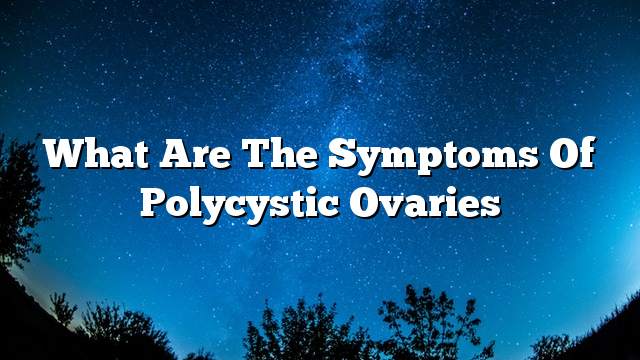Definition of PCOS
Know PCOS (in English: Polycystic ovary syndrome [PCOS] swelling of the ovaries and contain small follicles filled with fluid, and is this syndrome disorder common among women of childbearing age, as well as what caused the syndrome of symptoms, they also lead to multiple complications, including Type II diabetes and heart disease if not treated early and did not reduce the infected weight.
Among the symptoms of this syndrome is irregular or prolonged menstruation, and the interruption of menstruation or irregularity in adolescents may indicate the possibility of having the syndrome mentioned.
The prevalence of PCOS
PCOS affects about 10% of people between the ages of 18 and 44, but in some cases it may affect girls who are 11 years of age who have not yet been vaccinated, but are usually diagnosed during their 20s or 30s. This syndrome is not yet agreed upon, and the number of women is unknown.
Symptoms of PCOS
The symptoms and signs of PCOS are slightly different from one patient to another, but the common symptom among all women is weight gain, which usually stimulates the appearance of the syndrome shortly after the first menstrual period.
These symptoms and signs include the following:
- Multiple ovarian sores: This occurs when the ovaries inflate, as well as the fluid-filled bags around the oocytes.
- High levels of male hormone: This leads to multiple signs and symptoms, including severe acne; male alopecia form; and what is known as excessive hair style male, the length of hair and many, where the hair appears on the face and abdomen and chest.
- Menstrual disorder: This symptom is the most common symptom of the syndrome, including menstrual periods of more than 35 days, women’s menstruation less than 8 menstruations per year, and prolonged menstruation, whether light or heavy.
- To diagnose a woman with this syndrome, there should be at least two of the three symptoms listed above. Symptoms of this syndrome usually begin to appear shortly after the first menstrual period of the patient, as a result of a stimulus.
Causes of PCOS
The following factors are believed to be among the causes of PCOS, although the specific causes are still unknown:
- Genetics: Researchers are now working to identify whether this syndrome can be associated with certain genes. If a sister or mother has this syndrome, the risk of a woman’s infection increases.
- Increased Insulin: The insulin hormone enables cells to take advantage of sugar to get energy. If a woman has insulin resistance, the pancreas secretes the hormone excessively, which adversely affects the ovary’s ability to ovulate, because it increases the levels of the androgen hormone.
- Low-grade inflammation: The researchers found that people with this syndrome have this inflammation, as it stimulates the ovaries that are based on the release of androgen, and low-grade inflammation is known as a physical response that triggers the release of white blood cells to fight inflammation.
Complications of PCOS
The following complications may occur in patients with this syndrome, especially if accompanied with weight gain:
- Type II diabetes.
- Gestational diabetes or pregnancy-induced hypertension.
- Metabolic syndrome, which increases the risk of cardiovascular disease.
- Hypertension.
- Anxiety and depression.
- Non-alcoholic fatty hepatitis, a severe hepatic disease caused by the accumulation of fat in the liver.
- Fat and cholesterol disorders.
- You break your breath during sleep.
- Excessive bleeding of the uterus.
- Endometrial cancer.
- Infertility.
Treatment of PCOS
Although there is no cure for this disease yet, there is less likelihood of infertility and miscarriage, as well as other complications, which include uterine cancer.
The treatment of polycystic ovaries depends on the symptoms of each woman, as well as the conditions of each woman. For example, the treatment of those who desire pregnancy differs from the rest of the women. However, common methods among all women fall within the framework of living a healthy life in general. To lose weight If there is too much weight, all women may need to regain their menstrual cycle and their ability to ovulate is to lose weight, but how to do it is no different from that of any person who is overweight, by doing exercise and eating a diet Healthy and balanced food.
In general, women with this syndrome are particularly advised not to smoke as they increase the levels of the androgen hormone. If you do not have too much weight or do not succeed in losing weight, you may start using ovulation medications, including metformin and colomifen.
Hormone therapy also helps control ovarian hormones. For example, hormonal treatments help to treat unwanted hair and acne. Contraceptive pills help regulate menstruation, which leads to the lack of accumulation of menstrual blood in the lining of the uterus. This accumulation can lead to uterine cancer.
